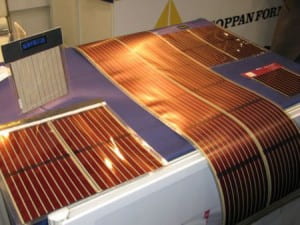Organic Electronics

Image Source: Shiny Plastic
Organic Electronics is an emergent interdisciplinary research field focusing on technologies that rely on organic (i.e. carbon-based) semiconductors, as opposed to traditional inorganic semiconductors. Organic electronics will help us address a number of important problems of modern society, such as renewable energy and green chemistry . This field may result in technologies, such as cheap, light and flexible or wearable electronics (e.g., rollable computer and TV screens, electronic paper and solar cells), energy efficient solid-state lighting, photo-detectors and molecular sensors. Virtually unlimited possibilities of synthetic chemistry and compatibility with inexpensive solution-based or printing fabrication techniques make organic semiconductors an extremely viable novel technology of the future.

Image Source: Kanarka
Traditionally, there have been three main routes of development of this field which corresponded to three classes of organic electronic devices, namely: (i) organic photovoltaic (OPV) cells (organic solar cells), (ii) organic light emitting diodes (OLEDs) and (iii) organic thin film transistors (OTFTs). Ching W. Tang, who built the first OLED and OPV cell in 1980s, is widely considered the father of organic electronics . The realization of organic electronic devices is contingent upon the development of appropriate materials, processing strategies and device structures which are scalable in terms of their cost, capacity, and capability. During the past decade, a significant progress has been achieved in the synthesis and characterization of organic semiconductors. A better understanding of material properties and interfaces between organic semiconductors and other materials had enabled the achievement of superior device performance. Inspite of the progress in applied research, such fundamental aspects of organic semiconductors as charge (polaron) and energy (exciton) generation and transport remain poorly understood.
Therefore, our interests lie in comprehensive study of organic semiconductors including: fundamentals, processing, mechanisms and applications in optoelectronics. We investigate basic physics of organic semiconductors that determine the operation of organic transistors, OLEDs and solar cells. Namely, we study transport properties of carriers in various small organic semiconductor materials and organic/organic, organic/inorganic interfaces. We also study properties optical properties of organic semiconductors, which are govern by long living Frenkel excitons.
Futhermore, the processing and patterning methods of organic semiconductors are lacking behind when compared to CMOS standards. We work to develop novel technology which enables existing semiconductor fabs to be used directly in the production of organic electronic devices. Another important outcome of this technology is that it will enable unique device geometries. For instance, it will be possible to manufacture organic electronic devices on nanometer size scale in lateral dimensions. Consequently, fabrication of innovative devices will significantly contribute in our knowledge of device physics.
